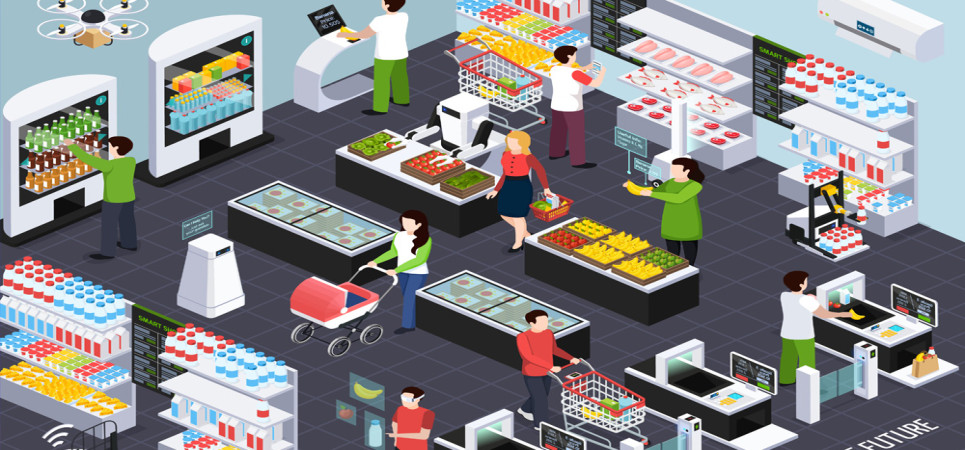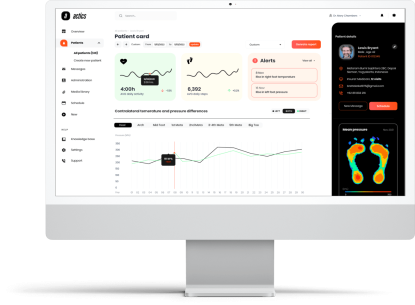
- April 3, 2025
- 1 second ago
My Shop Technologies
MyShop Technologies developed an advanced CMS platform to set up an online ordering system quickly and automatically on varied channels, among them: applications, websites, and interactive kiosks, as well as a management system fully integrated with the enterprise's deployed POS platform and management software.
The entrepreneurs who founded MyShop Technologies have vast knowledge and experience developing advanced technological tools, designing work methodologies, and managing large companies. The company was founded after it identified the need and huge demand for a fully automated application and website-building technology for independent restaurants and small businesses.
The proven economic value of MyShop's platform to increase online sales and activity of small and medium-sized businesses, alongside business streamlining and reduced third-party costs, garners great interest among restaurants and food shops in Israel and around the world and among companies operating catering services.
The company accumulates big data, and by using advanced technological tools turns it into valuable data for its customers' marketing activity and customer characterization, and as a database for market data and trend analysis. This data holds the potential to provide an additional source of income among the company's service offerings, and a significant value multiplier in the company's valuation.
The company's services and products are adjacent to markets enjoying growth attributed to the increasing demand for convenience and automation in the food industry and online food ordering and delivery. e.g., the global restaurant kiosk market segment is expected to show the most significant growth with a CAGR of 9.5%.
The company has hundreds of paying customers and has shown continuous quarterly revenue growth since beginning its activity in 2022.

Why Invest in My Shop?
- Advanced technology: MyShop's platform operates as a CMS system with advanced technology and high-level automation for the management and operation of a multi-channel ordering system. The company is working to integrate AI and deep learning technologies for data analysis to be used by its customers for their marketing needs.
- Leadership and excellence: the company's development methodology emphasizes the application of the highest standards in three areas: technology, digitization, and user experience. The system is tailored for users on both ends (businesses and end users), and continuously developed and adapted to address technological changes, new devices, interface platforms, and changing consumer behavior.
- Customers: the company has hundreds of monthly subscription customers, among them: restaurants, supermarkets, food stores, the catering system of the Israeli Knesset, and Feed Your Mind (Chef Haim Cohen's food and beverage services company at Microsoft-Israel). The company also has its first paying customers in the U.S. market.
- Proven feasibility: the system already operates in over 500 businesses and has successfully withstood extreme events of increased activity volume during busy hours, customer service, automation, and more.
- Strategic collaborations: the company has integrations and collaborations with numerous POS companies in Israel and with meal card companies. In preparing the operating infrastructure in the North American market the company initiated collaborations in this geographical area.
- Huge market potential: MyShop can automatically interface with any business anywhere in the world, and can therefore expand its activity to new markets and realize its growth potential in these markets.
- Value multiplier: the company accumulates big data and uses its technological tools to turn it into valuable data for SMBs, marketing activity, and analysis of broad market trends. This data holds the potential to be a significant value multiplier in the company's valuation.
- The entrepreneurs and leading team: the company was founded by Itsik Zizov and Roey Gesser. The entrepreneurs and the company's team bring diverse experiences of significant value to the company's business and technological development.

My Shop Creates a Strong Online Presence
Independent restaurants operating in the dynamic and competitive restaurant industry contend with the rapid digital change and with changing consumer preferences and therefore require a strong online presence.
Lack of presence, or a presence that is not up to date, can project the wrong image about the quality of the business, and can also hamper the restaurant customer's ability to navigate and receive the information needed to complete their order.

The time, knowledge, attention and monetary resources needed to finance and accompany the establishment of digital assets and an online ordering system pose a significant barrier for these businesses. At the same time, quick solutions offered by companies such as ‘Wolt', eat away at business revenues and impose very high costs and an expense burden on the business or the menu prices paid by customers. Furthermore, this presence is dependent on the operating company, its policy, and the changes it makes from time to time.
MyShop provides a solution to businesses that want to remain competitive and to establish and manage an updated digital presence that is accessible, provides high-level service, and is aligned with customer expectations in the current digital landscape.
All-In-One Platform
MyShop Technologies vision:
To simplify and streamline online ordering for small and medium-sized businesses throughout the world.
To realize this goal the company developed an advanced platform for automatically building and independently managing a multi-channel ordering system in a SaaS - Software as a Service model.
The platform enables a quick setup of ordering channels and to manage the entire system with continuous monitoring and control, from anywhere and on any device. All necessary operations needed to complete the order and manage the updated status of every order can be conducted and managed through the various ordering channels, among them: applications published in the Apple and Google App Stores, websites, landing pages for placing orders, and software for self-service kiosk terminals. The services included in the ordering system cover all the business activity needs and have a fully integrated interface with existing POS systems.
The Content Management System (CMS) for set up and end-to-end management of the ordering system also enables publishing and updating digital menus, payment clearance by the POS system used by the business, generating invoices, using smart cloud printers, producing various reports, and advanced integration with meal cards.

Activity Markets
The company's activity is adjacent to several markets experiencing accelerated growth, that were impacted by the significant momentum in the restaurant sector's adoption of digital and technological tools following the COVID pandemic lockdowns and social distancing policies.
Online Food Delivery Market
The global online food delivery market generated a value of 160.3 billion USD in 2022 and is estimated to reach 483.9 billion USD by 2032, achieving a compounded annual growth rate (CAGR) of 12% (2023 to 2032).
Restaurant meal delivery (RMD) is the highest-growing market segment, with a 38% market share of the food delivery market. This figure indicates that this market yielded a value of about 61 billion USD in 2022, and is expected to reach about 184 billion USD in 2032 according to the expected growth rate of this market.

Interactive Kiosk Market
The global self-service kiosk market size was estimated at 29.27 billion USD in 2022 and is expected to reach 40.1 billion USD by 2028, at a compound annual growth rate (CAGR) of 6.5% (2022 to 2028).
The global restaurant kiosk market segment is expected to show the most significant growth with a CAGR of 9.5%. This growth trend is attributed to the growing demand for convenience and automation in the food industry and to the increasing trend of online food ordering and delivery.
(Source: Self-Service Kiosk Market Size 2022 - 2028 | published by: Grand View Research)
Cloud Kitchen Market
A cloud kitchen, also known as a ghost kitchen or virtual restaurant, is a restaurant that does not provide dine-in or takeaway services to customers. Its activity is virtual and meal ordering is carried out through food delivery apps, website/web portal orders, and telephone orders.
The global cloud kitchen market was valued at 63.52 billion USD in 2022 and is forecasted to reach about 112 billion USD by 2027, with a compound annual growth rate (CAGR) of 12% (2023 to 2027).

Target Audience
The company currently focuses on independent restaurants and corporate catering companies to organizations in Israel and is preparing the infrastructure for penetrating international markets. The initial markets will be: North America and 2-3 countries in Europe.
The focus on food businesses, independent restaurants, and catering services, enables the company to develop accurate customized products and services for its target audience while tailoring them to the specific needs of each business.
The company operates in collaboration with POS and meal card companies in Israel and, and the future will collaborate with international companies in these areas. It will also maintain its competitive advantage that enables its customers to continue to operate their business with their existing systems and equipment and to fully integrate the MyShop system into their business.
Competition
In examining the market in which the company operates and its competitors, MyShop Technologies focuses on companies that operate in the local and international market that provide a platform and tools for improving the efficiency, operation, and user experience of independent restaurants. The competitors include:
- TOAST - offers a restaurant management platform and provides POS, online ordering, inventory management systems, and customer engagement tools.
- ChowNow - specializes in platforms for online ordering and restaurant food delivery. Its services enable restaurants to get their own branded apps and websites for mobile use.
- Square For Restaurants - a division of Square, a well-known payment processing company, Square for Restaurants offers a wide range of restaurant management tools, including POS, inventory management, employee management, and analysis systems.
- Upserve - offers a restaurant management platform that includes POS, analysis, inventory management systems, and online ordering capabilities.
- Tabit - provides a comprehensive restaurant management platform, including POS, order management, kitchen automation, and customer engagement tools.

Business Model
The company's business model is B2B of small and medium-sized businesses in the restaurant market and of corporate catering companies operating in large organizations.
The company charges a monthly fee for the use of the SaaS system and the scope of services according to various service plans.
The company is developing additional services and expanding its collaborations and the system's integration capabilities to offer its customers a wide range of advanced technological services and to scale up its revenue from existing customers.
Goals and Objectives
The goal of the company's commercial activity for the years 2023-2025 is to launch its activity in Europe and North America, in addition to expanding its activity in Israel. The aim is to drive two growth trajectories: the first, to increase the number of monthly paying customers; and the second, an expanded service offering to scale up the average monthly payment of the company's customers.



